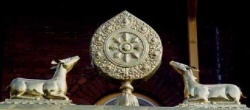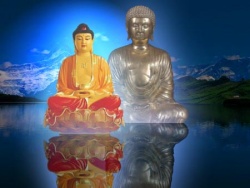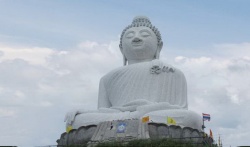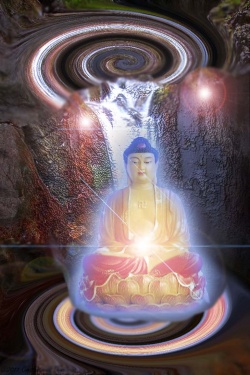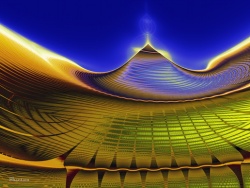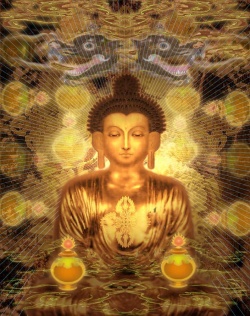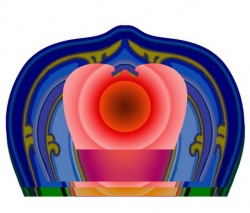Was Buddha An Atheist?
By Sant Sevi Ji Paramahans Maharaj
All the theistic religions of the world recognize the existence of God.
The Divine Being is referred to by various names due to different languages:
Brahman (Hindu),
God (Christianity),
Allah (Islam),
Buddha (Buddhism),
Tao (Taoism),
Yahweh (Judaism), and
Ahur Mazd (Zoroastrianism).
We can say that a religion with a belief in God is a theistic religion. Religions which do not have a belief in God would be called atheistic.
Upon careful consideration, we can see that there are in fact two types of atheism: entirely atheistic and partially atheistic.
The Belief Systems which do not have a belief in the existence of either God or soul are considered to be entirely atheistic.
Those which do have a belief in the soul but not in God are considered partially atheistic.
In modern times some scholars have interpreted the Buddha’s silence on the issue of the existence of God as atheistic. In their opinion, Buddha refused to answer any questions regarding the existence of the Divine Reality and the Soul (Atman or Jivatman), and therefore they have concluded that Buddha was an atheist.
However, in my opinion these kinds of conclusions demonstrate limited knowledge and ignorance about the essence of the Buddhist texts.
In fact, Buddhist literature contains multiple references to the soul (atta or atman), the Lord (Natha), and the maker of the body.
Examples can be found even in the fairly short book Dhammapada, where Buddha elaborates on Soul or self (atta):
"The atman is the lord of atman. What else could be the Lord? When the individual self jiivatman) is well subdued, a man finds the Lord (Natha) who is difficult to fathom" (Dhammapada 12/4).
Some scholars have interpreted the word ’lord’ in this verse as if it literally means ’lordship’. However, even a cursory examination of the words in Pali, the original language of these texts, yields the true meaning.
In Pali the word ’lord’ is in the second case accusative, and therefore it would best be translated as ’to the lord’.
The noted Buddhist scholar Bhikshu Rahul Sankrityayan has explained this in his rendering of this verse of the Dhammapada:
"A man is the lord of himself Who else then could be the lord? If the self is wholly disciplined then he is able to attain a lord who is difficult to be attained."
Buddha addresses the creator of the body: "Oh maker of the house I have seen you."
(Jaravaggo)
"Impermanence" of Buddhism and "Maya" of the Vedic Dharma
In the Vedanta literature, the Upanishads, and in the literature of the saints, this physical world is said to comprise both name and form, and is referred to as maya.
It is understood to be illusory and not real, to be ever changing, and dependent upon a higher reality In the Chandogya Upanishad, Brhidarnyaka Upanishad, Mundaka Upanishad, and Prashna Upanishad it is repeatedly stated that the nature of the world is transitory, destructible, and not real.
Therefore, we must seek for that essence which is constant, true and unchanging by transcending these realms of name and form.
The world of name and form is also described as avidya (ignorance) in the Katha and Mundaka Upanishads. In the Shvetashvatara Upanishad, the world is also described as illusory maya.
The Upanishads also explain that:
"The soul (atman), which is beyond name and form, is brimming with joy and tranquility. In its Turiyatita form (the fifth state -- a state of cosmic consciousness; a state of unity with the source), atman is beyond good and evil" (Teja bindu Upanishad).
Lord Buddha says:
"A mendicant is one who has no attachment to the world of name and form. He is one who does not grieve for what is not real (asat, the ever changing reality). This is the true mendicant. (Dhammapada, Bhikkhuvaggo)."
In the Ramcharitmanasa Saint Tulsida says:
"Name and form are the two obstructions to God."
All of these references from the Upanishads and the texts of the saints, show agreement with the words of the Buddha, not difference.
Ineffable Divine and Silence
One person may say the true form of God is Nameless (transcending any human definition), a second person may say the true form of God is Soundless (nihshabda; beyond sound), and yet a third may keep silence in regard to the nature of the Divine.
Is it logical to simply label the one who keeps silence an atheist? The wise person should reflect on this matter.
If you say that the Divine Reality is nameless and then proceed to describe Him, are you not contradicting yourself! How can you describe something which is nameless? In thinking about this example, one might well conclude that the third person, who was silent when describing God, was actually closer to the nameless description of God.
Keeping silence in answer to the question of the nature of the Divine, is also found in the Upanishads.
A prime example of this is found in the famous discourse between Sage Vashishta and Shri Ram in the Yoga Vashistha. Shri Rama had queried Guru Vasistha about the nature of Atman and Brahman (the Supreme Reality).
In response the Guru remained silent. Ram repeated the question. Guru Vasistha remained silent.
Shri Rama asked a third time, and still the great sage remained mute.
With joined palms Ram asked his teacher Vasistha: "Reverend Sir! Are you displeased with me and therefore not answering my question, since you always assist me in understanding?" Guru Vasistha replied: "My dear son! I am not displeased with you.
I have been answering the question which you have posed. The answer to your question is only given in silence, since the Divine is ineffable, unmanifest, and beyond the senses. How could I describe the nature of the reality which transcends the senses through these very sense organs (speech)?"
The point here is that if we were to call the Buddha an atheist when he is silent on the question of the nature of the Divine, as some people have, then logically we must also call Guru Vasistha an atheist when he is silent in answer to the same question.
Shunya and Transcendent Reality
Some scholars have discounted the Buddha’s teachings, claiming that he is promulgating a belief in "emptiness" or "nothingness." These scholars have concluded that the Buddha, does not believe in a Higher Reality (God).
Therefore, they argue, his philosophy should be considered as nihilistic.
According to their reasoning, it would follow that those who teach about "emptiness" or "nothingness" (shunya) [the transcendent form of Ultimate Reality is also referred to as shunya] cannot be theistic.
However, teachings about shunyata (emptiness) are not only found in Buddhist literature, but are also prominent in the writings of many of the saints. Here are some examples:
Gorakh Nath Ji says:
"It (God) is neither existent nor non-existent (shunya), its nature is beyond the reach of senses and thought."
Sant Kabir Sahab says:
"Meditation on the Formless (shunya) is enjoyed by all knowers of Truth." Guru Nanak Dev Ji says:"In the thought-less state of Samadhi (sunna, emptiness), neither maya (illusion) nor the web of mind exist. Only the gracious God exists."
Paltu Sahab says:"Staying in solitude and meditate on emptiness (shunya)."
Saint Dadu Dayal Ji says:
"That Ultimate Reality is beyond the dual categories of qualified and unqualified, it is Emptiness which transcends emptiness (shunya)."
Saint Charan Das says:
"When the soul is absorbed on the peak (highest inner realm) of emptiness, then it experiences rapture."
This emptiness is also known as ether (akasha) or void (avakasha). In the Ramcharitamanasa, Goswami Tulsi Das Ji invokes Lord Shiva: "I invoke the name of Shiva--Lord Shiva, who dwells in the space of infinite knowledge (akasha)"
There are discussions about shunya in the Tantra Shastra and the Jnanasankalnii Tantra, where it says, "Meditation is not meditation
unless the mind is united with Shunya".
Maharishi Mehi says:
"Consciousness that is traveling beyond sunna (void) and mahasunna (the great void) traverses the realm of bhanvar gupha (the whirling cave).
There it experiences the sound of Truth (sat), which is the Original Sound.
This Sound embodies the essence of the spiritual preceptor. 0 Practitioner! Hold on to that sound and become one with that True Sound."
In the Upanishads there are multiple references to Emptiness or Space (shunya).
In the fourth Brahmana of the Mandala Brahmanopanishad it is said: "There are five kinds of celestial Shunya (ether) which are increasingly more subtle:
akasham, parakasham, Mahakasham, Suryakasham and Parmakasham. The infinite light permeates all of these akasham, but the Parmakasham is ineffable and is brimming with infinite bliss. It is the essential element."
When one considers all these descriptions of Shunya (emptiness or void), the question arises whether the composers of the Upanishads and the saints were atheists. The unequivocal response is, of course, that they are not atheists.
How then could one logically consider the Buddha to be an atheist? The Buddha regularly speaks of both nirvana and Shunya in almost identical terminology, and yet he is accused of atheism solely on the basis of his silence on this question about the nature of God.
Sant Sevi Ji Maharaj
Sant Sevi Ji Paramahans Maharaj
Source
https://www.quora.com/Why-does-hinduism-declare-Gautam-Buddha-god-even-when-he-said-there-is-no-god
